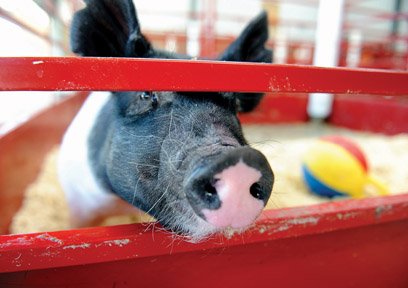
The Centers for Disease Control and Prevention has recommended people who are at high risk of serious flu complications to avoid visiting swine barns at fairs this year since they are seeing an increase in the number of cases of a new flu virus, H3N2v, this year. There have been no cases of this particular strain of the virus in California.
So far 306 cases have been reported in the United Sates, with the largest number of cases in Indiana and Ohio.
People who are not at high risk for serious flu complications are encouraged to use the following recommendations:
• Don’t take food or drink into pig areas; don’t eat, drink or put anything in your mouth in pig areas.
• Don’t take toys, pacifiers, cups, baby bottles, strollers, or similar items into pig areas.
• Avoid close contact with pigs that look or act ill.
• Take protective measures if you must come in contact with pigs that are known or suspected to be sick. This includes minimizing contact with pigs and wearing personal protective equipment like protective clothing and gloves and masks that cover your mouth and nose when contact is required.
• Wash your hands often with soap and running water before and after exposure to pigs. If soap and water are not available, use an alcohol-based hand rub.
• To further reduce the risk of infection, minimize contact with pigs and swine barns.
• Watch your pig (if you have one) for illness. Call a veterinarian if you suspect illness.
• Avoid contact with pigs if you have flu-like symptoms. Wait 7 days after your illness started or until you have been without fever for 24 hours without the use of fever-reducing medications, whichever is longer. If you must have contact with pigs while you are sick, take the protective actions listed above.
Those who are at high-risk for serious infections from the flu, including children younger than 5 years old, people ages 65 and older, pregnant women and those with long-term health conditions such as asthma, diabetes, heart disease, weakened immune systems and neurological or neurodevelopmental conditions.
For more information, call 1-800-CDC-INFO or visit http://www.cdc.gov/flu/swineflu/h3n2v-fairs-factsheet.htm









